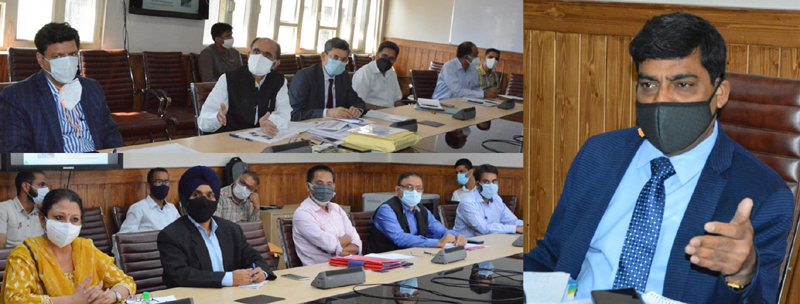Excelsior Correspondent
SRINAGAR, June 22: The Chief Secretary, Dr. Arun Kumar Mehta today chaired a meeting to review functioning of various wings of Forest, Ecology & Environment Department.
Commissioner/Secretary, Forest, Ecology & Environment Department along with Principal Chief Conservator of Forest, Director, Ecology, Environment & Remote Sensing, Chairman and Member Secretary, Pollution Control Board (PCB) and concerned HoDs participated in the meeting.
It was informed that Jammu and Kashmir has 20,194 sq km of forest area which is 47.80% of its geographical area with 55% forest and tree cover, and 43% open forest. Besides having the maximum number of forest types, J&K also has the highest biodiversity of herbs in the country.
Economically, the forest in Jammu and Kashmir generates 2 million man-days of employment and has a monetary value equivalent to Rs. 1.93 lakh crore.
To enhance contribution of the department in economic activities, the Chief Secretary directed sustainable development through the deregulated sale of various Non-Timber Forest Produce (NTFP). The Department was also asked to draw a strategy to enhance the commercial viability of Minor Forest Produce (MFP) through Biodiversity Management Committees.
The Chief Secretary directed increasing the forest cover through a dedicated Green J&K Drive to plant 1.30 crore saplings across J&K in 2021-22. Additionally, the department was asked to undertake plantation of 23.61 lakh plants under Green India Mission and District Capex Budget along with the production of 96.46 lakh saplings in Government nurseries.
The Chief Secretary further directed the Forest Department to constitute Village Panchayat Plantation Committees in all 4290 Panchayats, besides conducting monthly dialogues with these committees to evolve region-specific sustainable models defining scientific exploitation of forest based fodder, fuelwood, and other MFPs.
To ensure widespread people’s participation in Government-sponsored plantation drives, the department was also asked to adopt a multi-disciplinary convergence model linking school-level eco clubs, Village Panchayat Plantation Committees and MGNREGA works to various plantation and protection drives.
Further, the Forest Department was asked to evolve a strategy for phased rehabilitation of degraded forest land over the next five years through community participation and ownership.
Emphasizing the need for real-time reliable data on air quality in the Union territory, the Chief Secretary directed the Pollution Control Board to expedite installation of Continuous Ambient Air Quality Monitoring System (CAAQMS) in all districts of Jammu and Kashmir. PCB was further asked to extend assistance to J&K Police in strict implementation of vehicular air pollution norms.


